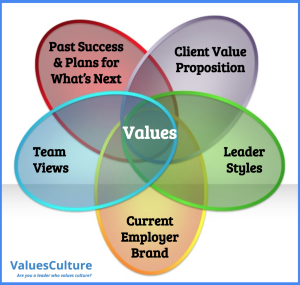Achieving clarity on what your organizations stand for is especially important in a chaotic world. As Alexander Hamilton said at another turbulent time in history, “If you don’t stand for something, you’ll fall for anything.”
But with all the chaos, how do you get a clear view of what your company really stands for?
To define or update your organizational values with a high degree of confidence, you’ll need a data-driven process.
Of course, there are skeptics out there who believe that you can’t pin down something as ethereal as organizational culture using information that’s sufficiently tangible, specific, and reliable, particularly contemporary data-centric leaders.
But you can. Here’s how to identify the behavioral differentiators that define your secret sauce.

Client value proposition. A good place to begin might be with your customer. Take a set of competencies (I’m a fan of the comprehensive research-based Korn Ferry Leadership Architect), and mercilessly trim your list down to only those several behaviors that truly provide value to your clients. (If you aren’t sure what your clients like most about you, ask them!) Figuring out your client value proposition is a big step toward distilling a set of values that describe your behavioral strengths.
Leader styles. Maybe you’ve already done some work as a leadership team with DiSC, MBTI, Predictive Index, or something else. Use whatever framework or lexicon you’ve adopted to objectively leverage your self-awareness of leadership team styles. See how many of the competencies that survived the Client Value Proposition gauntlet are the likely default behaviors of your leaders.
Current employer brand. Time to pluck up the courage to read reviews on Glassdoor, Indeed, Comparably, etc. Also, when negative reviewers are forced to populate the “Pros” section before they can rant in the “Cons” section, they may be, reluctantly, touching on your secret sauce.
Team views. What are your people saying about you in internal (and anonymous) employee surveys? (You are doing those, right?) Such surveys can feasibly get an 80% response rate. To discover what people see as your behavioral strengths, again, just ask them.
Past success and plans for what’s next. What does your origin story tell you about which behaviors you truly value? Where have you placed your bets on your organization’s future? What set of outcomes have you committed to, for your team, marketplace, board, investors? Think through how these inform which behaviors are most important to achieve them.
Once you’ve examined behaviors through all five lenses, you’ll be in a far better position to gauge where they overlap to identify the values most important to your organization. It may be a tough call ultimately, but the decision can have lasting and significant impact.
